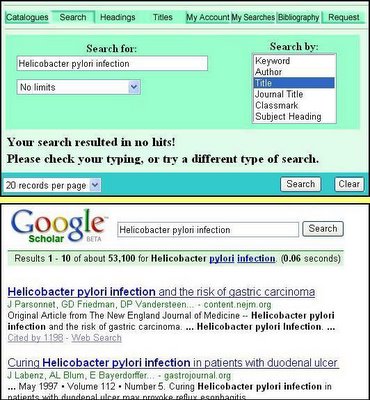I Want To Discover Information, Not Search Collections
It is true that if I am in my local public library branch, or I am an undergraduate with a deadline, I go into the library and say "What have you got ?" But if I am trying to find, say, research that links stomach ulcers with Helicobacter pylori, I absolutely do not want to be limited to my library's current physical holdings and online subscriptions.
 Now some librarians recognise this and try to provide the widest possible capability to search metadata and full-text independent of collections, but there still seems to be a hard-core of 'collection-centric' librarians. Indeed, at a recent conference workshop on electronic resource management software, I was shocked by how the librarians present unanimously demanded the capability to ensure that there was no bibliographic data in the catalogue relating to journals to which the library did not subscribe.
Now some librarians recognise this and try to provide the widest possible capability to search metadata and full-text independent of collections, but there still seems to be a hard-core of 'collection-centric' librarians. Indeed, at a recent conference workshop on electronic resource management software, I was shocked by how the librarians present unanimously demanded the capability to ensure that there was no bibliographic data in the catalogue relating to journals to which the library did not subscribe. Similarly, at Bielefeld last week, Anurag Acharya from Google made a strong case for the wonders of Google Scholar, and to some extent made the case that many researchers want to discover 'everything' (Google Scholar) before they go on find out what is in their library. Yet he made this case at a technical and product level, and I think missed an opportunity to take a "librarians must serve readers" line, making clear that many librarians, and systems, and services are not meeting the needs of researchers in this way.
At the moment we have a range of inadequate services to 'discover everything' (journal citation services are not bad, and of course Amazon is the premier bibliographic source for monographs), and librarians should be welcoming Google Scholar in principle (whilst continuing to challenge particular facets of the system).